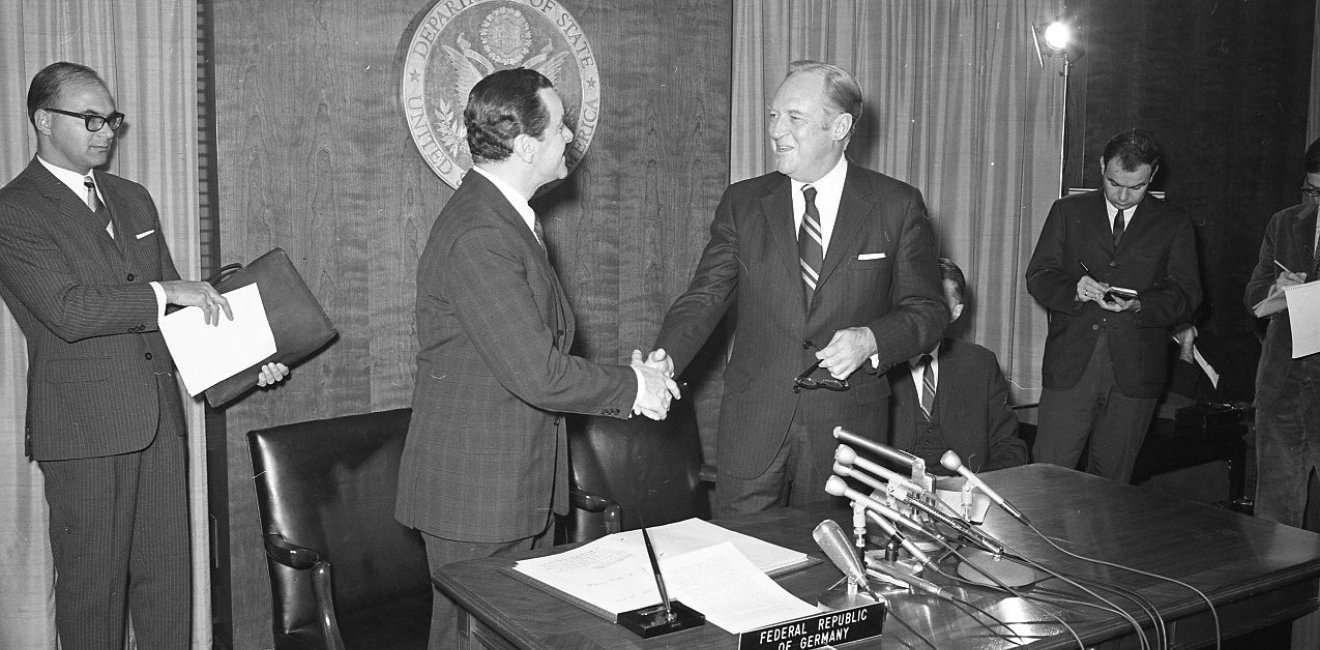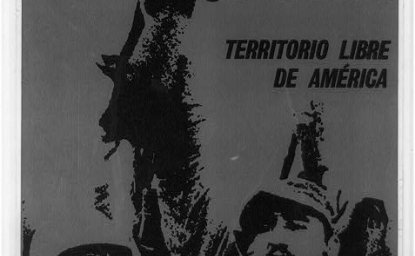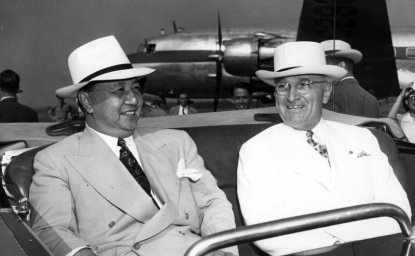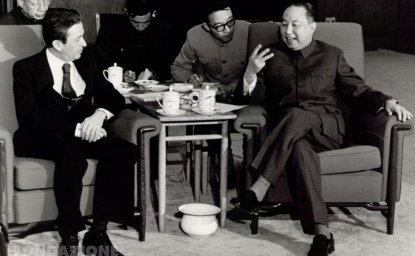When the Nuclear Non-Proliferation Treaty (NPT) opened for signature in 1968, officials in Bonn fiercely debated whether and under what conditions the Federal Republic of Germany should accede to the agreement.
In late 1966, a “grand coalition” cabinet was formed by Christian Democrats from the CDU, the Bavarian CSU, and the Social Democratic Party (SPD). Surprised by a breakthrough in secret Soviet-US NPT negotiations in the autumn of 1966, leaders in Bonn expected that the NPT negotiations would very likely result in a globe-spanning multilateral treaty in the near future. There was a widespread opinion in West Germany that the country had no real choice but to accede to this treaty – at least according to the preferences of the United States, the Soviet Union, Great Britain, and practically all other European states irrespective of their alignment.
Yet the government under Chancellor Kurt-Georg Kiesinger (CDU) was split from the outset on whether and under what conditions Germany would sign and ratify the NPT.
It was only following the Bundestag elections of 28 September 1969, which led to a new coalition government formed by the SPD and Liberals (FDP) under Chancellor Willy Brandt (SPD), that Germany signed the NPT. When the government signed the agreement on 28 November 1969, its representatives included a declaration and a note to make clear its conditions.[1] This was also a first step in West Germany’s “Neue Ostpolitik” that would lead to, inter alia, the Soviet-German Moscow Treaty of 1970, West Germany’s admission to the United Nations in 1973, and the ratification of the NPT in 1975.
A tranche of documents, recently added to the Wilson Center Digital Archive and introduced here, focuses on the government deliberations on whether and how the FRG should accede to the NPT.
Most of the documents are dated from July-September 1968, after the NPT had opened for signature. This breakthrough prompted a new round of examination in Bonn of the conditions under which Germany might accede. At this point, policymakers also looked back on one-and-a-half years of specific diplomatic efforts by West Germany, at that time still a non-member of the United Nations, to influence provisions of the NPT, interpretations of those provisions, and accompanying assurances to non-nuclear weapon states.
Depending on policymakers’ views on how demanding or restrictive conditions for Germany’s accession to the treaty should be, policymakers gave or suggested negative or positive answers to the fundamental question of whether Germany should accede to the NPT.
Unsurprisingly, no stable consensus on policy could be worked out at senior official levels. Indeed, disagreements intensified, especially after Soviet forces crushed the Prague spring in late August 1968. West German diplomacy was tasked once again with seeking further improvements on disputed issues. In the last year of the “grand coalition” government in Bonn, NPT-related disputes became increasingly acrimonious, which led to paralysis on the accession issue. A rupture of the coalition could be averted thanks to the foreseeable end of the Bundestag’s legislative period in the autumn of 1969 and Kiesinger’s disposition to postpone a basic decision on whether to accede.
These disputes and the resulting political paralysis on NPT signature could distract at the time from three important political realities. First, no matter how many skeptics advocated signing the treaty, “among the 50 or 60 top politicians and officials there is not one who supports the NPT,” as one US diplomat put it.[2] Second, whether the “FedRep” signed and ratified the NPT or not, “there was no issue whatsoever of any German national nuclear authority or decision over nuclear weapons, or of any national production of weapons.”[3] Third, German governments supported the basic principle of nuclear non-proliferation, even if the government disapproved of the NPT approach until late 1966 and even if various policymakers continued to oppose it thereafter.[4]
***
In a stern letter to the Chancellor of mid-February 1967, the Minister of Finance Franz Josef Strauß explained that he would “fight against” the NPT. Strauß was chairman of the Bavarian CSU and had served as Minister of Defense between 1956 and 1962. His point was that a decision to accede to the treaty was unthinkable as long as he remained minister in Kiesinger’s cabinet and, hence, with the CSU participating in the “grand coalition.” Strauß’ letter also made clear his suspicions of Foreign Minister Willy Brandt and Brandt’s disposition towards the NPT, which Strauß apparently regarded as submissive.
After 1 July 1968, when the NPT opened for signature, Brandt brought up the accession question in a letter to the Chancellor, arguing that the “credibility of our détente policy” depended on Germany acceding to the NPT. In his review, the German government should sign the treaty by “early autumn.” Brandt’s letter mirrored arguments made previously by Georg-F. Duckwitz, who was State Secretary in the Foreign Office.[5]
Later that month, Brandt answered a letter in which Strauß had asked the Foreign Minister to comment on a translated “note on problems” of the NPT, which he claimed to have received from “French friends.” The note argued that the ambiguous wording of NPT articles I and II concerning indirect transfer of control of nuclear weapons would pose problems. The Soviet Union might politically exploit it over time to “put Germany on a path towards neutrality.” The document also alluded to a concern that the Soviet Union might later argue that non-nuclear weapon states’ (NNWS) participation in “nuclear NATO” – such as allowing nuclear weapons deployments in their territories – violated their NPT commitments.
Brandt answered Strauß by forwarding a memorandum from the Federal Government Commissioner for Disarmament and Arms Control, Ambassador Swidbert Schnippenkötter, who clarified that the ambiguity in wording reflected “a quite conscious dissent” between the United States and the Soviet Union. Concerns about this point of legal ambiguity remained central to the lines of argument taken by NPT opponents and many NPT skeptics in Bonn through late 1969 and, to a lesser extent, though 1973 and 1974 when NPT ratification was debated.[6]
NPT opponents continued to hold competing views on how to thwart Germany’s accession to the treaty. Strauß’ approach was to oppose the NPT as categorically and directly as possible. In the late summer 1968, Strauß even told his fellow CSU friends that he was determined to terminate the cooperation between the CSU and CDU in their joint Bundestag faction if the government was prepared to sign the NPT. It had been a “big mistake,” he argued, to “allow” Brandt and the Foreign Office engage in “detailed negotiations” and obscure what he felt like were core problems with the treaty.[7]
Strauß positioned himself to end the government coalition and the party-political cooperation with the CDU, if CDU leaders and particularly Kiesinger acted contrary to his expectations.[8]
Other opponents, called “fundamentalists” by critics who dubbed themselves “pragmatists and realists,” agreed with the objective of blocking Germany’s accession to the NPT but pursued a different method. Instead of posing the “yes or no” question, they preferred to ask what a “good NPT” – to which the FRG might at some point be able to accede – might look like.[9] The implied suggestion was that a “good NPT” could not actually be achieved.
Two of the most knowledgeable proponents of this approach were the diplomats (and jurists) Schnippenkötter and Wilhelm G. Grewe, Germany’s Permanent Representative to NATO. Both Ambassadors did not shy away from arguing their case in public. This behavior was widely seen as publicly contradicting Foreign Minister Brandt’s position. On the first of those occasions, Helmut Schmidt, at the time chairman of the SPD faction in the Bundestag, publicly indicated that he would have dismissed Grewe, had he been Foreign Minister.[10]
All of this was part of the domestic and bureaucratic context when Chancellor Kiesinger asked the Foreign Office after the “Czech crisis” of late August 1968 to examine the “political consequences” of a “hypothetical case of a German non-signing of the Non-Proliferation Treaty.”
The request was forwarded by Director-General Hans Ruete to Grewe, Helmut Allardt, Ambassador to the Soviet Union, and Schnippenkötter, who attended the UN Conference of Non-Nuclear Weapon States in Geneva.[11] In Grewe’s judgment, it would be a “benefit” for the NATO alliance, “likely even a condition of her future viability,” if the NPT were to fail. He conceded that “if it was the missing German signature which brought the NPT down,” then that would lead to “a severe stress test,” but as a NATO member state, Germany could get through the crisis.
In a telex he sent from Geneva, Schnippenkötter estimated that “negative consequences” would be “objectively low, but stronger in the atmospheric.” For the Soviets, the NPT was no “conditio sine qua non” for commencing negotiations on strategic nuclear arms. And in the United States, there would be “a certain annoyance” among Democrats but that would be all. Allardt counselled to sign the NPT in London and Washington under certain conditions, while making the signing in Moscow dependent on accommodating Soviet behavior to “create the conditions” for it.[12]
To prepare the Foreign Minister for a conversation with the Chancellor, Ruete forwarded Schnippenkötter’s analysis and an additional assessment to Brandt. At Ruete’s request, the additional assessment was prepared by a specialist from the Commissioner’s subdivision in the Foreign Office, Otto Hauber, who coordinated it with other officials in the ministry. As Hauber told Ruete, his “political evaluation” differed from those of the three Ambassadors and it was impossible to find a “common denominator.”[13] Within the Foreign Office, yet another strand of assessment was pushed aggressively by the Policy Planning Staff, headed by Egon Bahr, who was of course not a diplomat but Brandt’s confidant since the latter’s tenure as major of West Berlin.[14]
These documents show that when senior officials in Bonn assessed the NPT and Germany’s potential accession, tensions, dissents, and contradictions came to the fore. This made it difficult to manage related processes even within the otherwise responsible Directorate-General of the Foreign Office, not to speak of the political challenge of maintaining an elementary degree of cohesion of the government coalition concerning the subject matter.
As the documents indicate, the competition about influencing and shaping government policy on the accession question was fierce. Deliberations often tended to become obstinate and were mostly shrouded in a highly specialized but also passionate phraseology. Until the “social-liberal coalition” took over in 1969, largely repetitive rounds of argumentative battle followed, mostly between unrelenting NPT opponents and a slowly growing number of skeptics who grudgingly advocated or at least began to accept Germany’s eventual accession to the NPT.
Associated Documents
Document No. 1
Letter, Minister Franz J. Strauß to Chancellor Kurt G. Kiesinger, 15 February 1967
Archiv für Christlich-Demokratische Politik, St. Augustin (ACDP), Nachlass Kiesinger, I-226-285. Contributed by Andreas Lutsch and translated by Bernd Shaefer.
Document No. 2
Letter, Minister Willy Brandt to Chancellor Kurt G. Kiesinger, 15 July 1968
Politisches Archiv des Auswärtigen Amtes, Berlin (PAAA), B 43, IIB1, Bd. 787. Contributed by Andreas Lutsch and translated by Bernd Shaefer.
This document also appears in Akten zur Auswärtigen Politik der Bundesrepublik Deutschland 1968, doc. 221: https://www.degruyter.com/document/doi/10.1524/9783486718195/html#contents, and Willy Brandt. Berliner Ausgabe. Herausgegeben von Helga Grebing, Gregor Schöllgen und Heinrich August Winkler. Im Auftrag der Bundeskanzler-Willy-Brandt-Stiftung. Bd. 6: Ein Volk der guten Nachbarn. Außen- und Deutschlandpolitik 1966-1974. Bearbeitet von Frank Fischer (Bonn: Dietz, 2005), 155-158.
Document No. 3
Letter, Minister Franz J. Strauß to Federal Minister of Foreign Affairs, Mr. Willy Brandt, 2 July 1968
PA AA, B 1, Bd. 378. Contributed by Andreas Lutsch and translated by Bernd Shaefer.
Document No. 4
Letter, Minister Willy Brandt to Franz J. Strauß, with Attachment 'Comments on a French Note sent by the Federal Minister of Finances to the Federal Minister of Foreign Affairs by Letter of July 2, 1968', 25 July 1968
PA AA, B 1, Bd. 378. Contributed by Andreas Lutsch and translated by Bernd Shaefer.
Document No. 5
Wilhelm Grewe, 'Consequences of a potential German non-signing of the NP Treaty', 5 September 1968
PA AA, B 130, Bd. 4338. Contributed by Andreas Lutsch and translated by Bernd Shaefer.6 pages
This document also appears in Akten zur Auswärtigen Politik der Bundesrepublik Deutschland 1968, doc. 283: https://www.degruyter.com/document/doi/10.1524/9783486718195/html#contents
See also Wilhelm G. Grewe, Rückblenden. Aufzeichnungen eines Augenzeugen deutscher Außenpolitik von Adenauer bis Schmidt (Frankfurt et al.: Propyläen, 1979), 694f.
Document No. 6
Report No. 597 from Swidbert Schnippenkötter, Geneva, 6 September 1968
PA AA, B 130, Bd. 10080. Contributed by Andreas Lutsch and translated by Bernd Shaefer.
Document No. 7
Otto Hauber, 'Note requested by the Federal Chancellor regarding the consequences of a potential German non-signing of the NP [Non-Proliferation] Treaty', 16 September 1968
PAAA, B 130, Bd. 10080. Contributed by Andreas Lutsch and translated by Bernd Shaefer.
[1] Federal Republic of Germany, Note and Statement accompanying Signature of Treaty on the Non-Proliferaton of Nuclear Weapons (NPT), November 28, 1969, https://treaties.unoda.org/a/npt/germany/SIG/london.
[2] Memorandum Fried, 3 Nov. 1967, Foreign Relations of the United States, 1964-1968, XV, Germany and Berlin, doc. 235, https://history.state.gov/historicaldocuments/frus1964-68v15/d235.
[3] Remarks by Minister of Defense Gerhard Schröder: MemCon Schröder-Laird et al., 1 Feb. 1969, Gerald R. Ford Presidential Library, Ann Arbor, MI, Box C13, NATO docs 4-6, Laird papers.
[4] See, e.g., Vertrag über die Nichtverbreitung von Kernwaffen. Dokumentation zur deutschen Haltung und über den deutschen Beitrag. Veröffentlicht durch das Presse- und Informationsamt der Bundesregierung (Bonn: H. Köllen, 1969).
[5] Memorandum Duckwitz, 6 July 1968, Politisches Archiv des Auswärtigen Amtes, Berlin (PA AA), B 150, Bd. 130.
[6] The unclassified Schnippenkötter memorandum was also used as an argumentative device in public. The CSU’s weekly newspaper, of which Strauß was editor-in-chief, later printed the full memorandum: Material zum Fall Schnippenkötter, Bayern-Kurier, 15 Feb. 1969. Strauß, in particular, continued to reference it: Franz Josef Strauß, Es geht um die Zukunft Deutschlands, Bayern-Kurier, 15 Nov. 1969. On concerns about the implications of the ambiguity of articles I and II of the NPT, see the Bundestag plenary debates on 8 Nov. 1969 on the government’s intention to sign the NPT and on 20 Feb. 1974 when the Bundestag voted on ratification. See also the protocol of the confidential joint session of the Bundestag Committee on Foreign Policy and of the Bundestag Committee on Defense Policy on 27 Nov. 1969: Karl-D. Bracher et al. eds., Der Auswärtige Ausschuss des Deutschen Bundestages. Sitzungsprotokolle 1969-1972 (…). Erster Halbband November 1969 – Juni 1971 (Dusseldorf: Droste, 2007), 9-43, and the protocol of a special meeting of the CDU/CSU Bundestag faction on 12 Feb. 1974, Archiv für Christlich-Demokratische Politik, St. Augustin (ACDP), VIII-001-1035/1.
[7] Handwritten note zu Guttenberg „Reichenhall 16/9“, 16 Sep. 1968, Staatsarchiv Bamberg, NL Guttenberg, Bd. 94.
[8] The situation was a potential precedent for event in late 1976, when Strauß persuaded the CSU group within the CDU/CSU faction in the Bundestag to cease the cooperation with the CDU. This went hand in hand with an ambition for the CSU to compete with the CDU in all West Germany. But when CDU indicated that it could compete with the CSU in Bavaria, the CSU revised its position.
[9] Letter Mertes to Groepper, 4 April 1967, ACDP, I-403-090/1. Within the Foreign Office subdivision headed by Schnippenkötter, the diplomat and “fundamentalist” Alois Mertes served in the department II B 2.
[10] Schlag der Trommeln, Der Spiegel, 27 Feb. 1967, 28.
[11] Telex Ruete (director of division II), 30 Auf. 1968, PA AA, B 130, Bd. 4338.
[12] Telex Allardt to Ruete, 7 Sep. 1968, Akten zur Auswärtigen Politik der Bundesrepublik Deutschland 1968, doc. 288: https://www.degruyter.com/document/doi/10.1524/9783486718195/html.
[13] Memorandum Hauber for Ruete, 16 Sep. 1968, PA AA, B 130, Bd. 4338.
[14] See, e.g., memorandum Bahr, 24 Feb. 1969, PAAA, B 1, Bd. 379.









